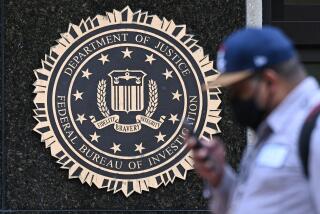Webster Tells of Two More Bids by North to Stall Probes
- Share via
WASHINGTON — FBI Director William H. Webster, concluding his confirmation hearings to be CIA director, Thursday disclosed two additional attempts by Lt. Col. Oliver L. North to delay federal criminal investigations involving figures linked to efforts to finance Nicaragua’s contras during the period when U.S. government aid was illegal.
In one case, North sought to delay a federal grand jury appearance by Richard R. Miller, who was accused by an admitted participant Wednesday of taking part in a conspiracy to defraud the government in connection with more than $2 million that was raised for the contras.
Despite the new disclosures, Webster appears headed for confirmation by the Senate Intelligence Committee and by the full Senate. The committee will vote on his nomination today.
Postponed Appearance Asked
According to Webster and a letter to the committee from Oliver B. Revell, the FBI’s executive assistant director for investigations, North called Revell in April, 1986, and requested postponement of Miller’s appearance before a federal grand jury investigating a Philadelphia bank fraud.
North, who served with Revell on a National Security Council terrorism panel, said that Miller had worked under contract for the NSC and State Department and that he was involved in activities to free U.S. hostages in Lebanon, Revell said.
Because North was then the NSC official responsible for coordinating interagency activities on the hostages, Revell said he regarded his request as “entirely appropriate and not an intrusion into our investigative responsibilities.” North has since been fired from his NSC post.
Webster, although not disagreeing with Revell’s evaluation, made clear that he was unhappy over Revell’s failure to discuss the matter with him before contacting an assistant U.S. attorney about North’s request.
Delay Arranged
As it turned out, the delay already had been arranged by Miller’s lawyer, and Miller subsequently cooperated in the government investigation, the officials said.
Webster said that he has had “a conversation with Revell” since learning of the incident earlier this month. “It involved intervention in the judicial process, and I would (normally) discuss that with the Department of Justice,” he said.
Wednesday, a conservative fund-raiser, Carl R. (Spitz) Channell, identified Miller as a co-conspirator in a scheme to illegally use tax-exempt contributions to buy arms for the contras. Miller, a Washington public relations executive, Thursday denied the accusation. Channell pleaded guilty to one conspiracy charge in the case, filed by the independent counsel investigating the Iran-contra affair.
‘Prince’ Incident
In the second incident disclosed Thursday by Webster, North on July 18, 1985, asked FBI agents to delay an interview of Mousalreza Ebrahim Zadeh, also known as “the Prince,” who was representing himself as a member of the Saudi royal family.
North, an FBI summary of the case says, was aware that Zadeh “was interested in placing money at the disposal of the Nicaraguan Freedom Fighters.
“North stated he had no desire to interfere with a criminal investigation but believed an FBI contact of Zadeh might reverse his decision to make a donation.”
At the time, Zadeh was being investigated for fraud, but that inquiry was not affected by North’s request, since the FBI agent and prosecutor dealing with the matter had no intention of questioning Zadeh then “because they believed he might flee the United States prior to being charged,” the summary said.
Guilty of Bank Fraud
Zadeh eventually pleaded guilty to bank fraud charges in two states and is serving a five-year prison term, the FBI summary says. There is no indication that he ever made the donation to the contras.
An FBI Teletype of North’s July 18, 1985, discussion with the bureau quoted North as saying that he talked to President Reagan and then-National Security Adviser Robert C. McFarlane personally about “the Prince’s” interest in helping the contras.
Webster asserted that despite the contacts, “Col. North had no pipeline into the FBI, and agents of the FBI were not giving him information to which he was not entitled.”
It was disclosed previously that North called Revell last October to emphasize the sensitivity of another FBI investigation involving Southern Air Transport, which was ferrying supplies covertly to the contras.
More to Read
Sign up for Essential California
The most important California stories and recommendations in your inbox every morning.
You may occasionally receive promotional content from the Los Angeles Times.










